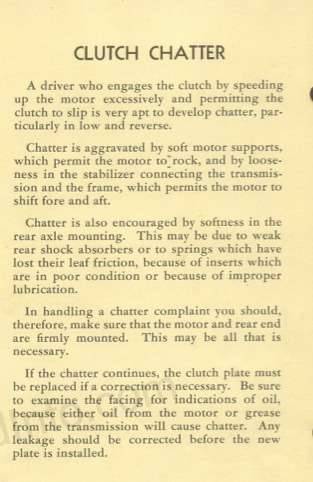|
Re: Shudder when letting out clutch in 1st
|
||||
|---|---|---|---|---|
|
Forum Ambassador
|
You may have seen this article but here is Packard recommendations on looking for chatter causes. Sounds like you have covered most of them. You mentioned the rubber support for OD. Was that the spring wrapped vertical piece or does it include the long stabilizer rod between trans case and frame. That is one area others have mentioned issues because it was missing or the rubber bushings had deteriorated.
Attach file:  (28.49 KB) (28.49 KB)
Posted on: 2014/12/31 15:24
|
|||
|
Howard
|
||||
|
||||
|
Re: Shudder when letting out clutch in 1st
|
||||
|---|---|---|---|---|
|
Forum Ambassador

|
... one of the characters made reference to that shudder, leading me to believe it was a common ailment in older cars. Any ideas?
It may be an ailment common to old cars just because they are old, but certainly was not characteristic of them when they were new, or properly serviced and maintained. Given what you've already looked at, I'd focus on the clutch itself.
Posted on: 2014/12/31 16:02
|
|||
|
||||
|
Re: Shudder when letting out clutch in 1st
|
||||
|---|---|---|---|---|
|
Home away from home

|
Quote:
...leading me to believe it was a common ailment in older cars... Don (dons50pack), don't believe this. Even when working on cars, whose design was anything but at the Packard quality level I refused to accept "common ailments" as an excuse. The shudder is a dynamic unbalance or escalated vibration and has identifiable reasons like those, Howard (HH56) and Dave (O_D) mentioned.
Posted on: 2014/12/31 16:07
|
|||
|
The story of ZIS-110, ZIS-115, ZIL-111 & Chaika GAZ-13 on www.guscha.de
|
||||
|
||||
|
Re: Shudder when letting out clutch in 1st
|
||||
|---|---|---|---|---|
|
Home away from home
|
Thanks for the article. I replaced both the spring wrapped vertical piece and the "nubbers" on each end of the long stabilizer rod between trans case and frame. I'll check out all other potential soft support points mentioned in the article. Thanks to all who responded.
Posted on: 2014/12/31 18:14
|
|||
|
||||
|
Re: Shudder when letting out clutch in 1st
|
||||
|---|---|---|---|---|
|
Just can't stay away
|
I'm probably going to catch a lot of flak over this, but here goes:
I had the same problem. I asked my mechanic to troubleshoot the issue and he couldn't find an obvious problem. He's a good mechanic--his daily driver is a 1939 Dodge--and his diagnoses are usually correct. He asked me what type of motor oil I was using and I told him, Shell Rotella. He told me that was the problem. He said that modern oils are manufactured to have small, short-chain molecules. These small molecules are inappropriate for older cars, he said, because they can get past and through seals. This causes the clutch to slip and shudder when you let up on the pedal while the car is standing still. He suggested I replace the Rotella with Chevron Delo 100. The Chevron oil is still available in some markets where older Detroit Diesel engines are in use. Delo 100 is essentially an obsolete oil that only goes in obsolete engines. I did as he suggested and was pleasantly surprised. It took about 4-5 months for the shuddering to stop, and it hasn't gone away completely, but the performance is WAY better today than it was when I was using the Rotella. My 1950 is a daily driver and I'm guessing I had to put 2-3,000 miles on it for the shuddering to get to where it is now. I've put 5-6,000 miles on the car using the Delo 100 and have not noticed any negative effects.
Posted on: 2015/1/7 23:32
|
|||
|
||||
|
Re: Shudder when letting out clutch in 1st
|
||||
|---|---|---|---|---|
|
Home away from home
|
Thanks for the response. I'll try anything once, but here's the thing with my car. The shuddering problem was around long before I started using Rotella T last year. For the first 60+ years of it's life the car used conventional motor oil (of various viscosities). If memory serves (many times it doesn't!) the shuddering problem appeared once I started driving the car again after letting it sit for years.
Posted on: 2015/1/8 0:59
|
|||
|
||||
|
Re: Shudder when letting out clutch in 1st
|
||||
|---|---|---|---|---|
|
Home away from home

|
Hi Don:
I'm not sure what is meant by "The clutch and differential have recently been rebuilt" and "the shuddering problem appeared once I started driving the car again". If the clutch has been replaced after the storage period I would suspect a parts problem. I always used Fort Wayne Clutch in Indiana but Custom Clutch in Cleveland has also been recommended. The time I didn't use these vendors (on a Ford) the results were rotten. If the clutch was replaced before the period of storage I would suspect rust on the transmission shaft. Of course no clutch job should be done without using a transmission jack and correct pilot tool. Not using either can bend the Marcel and cause problems. On the oil side, I would stick to straight grade motor oils, as specified in the manual, for summer use given those motors don't have a dynamic rear main seal. I'm hearing too many complaints about oil leaks. Hope this helps.
Posted on: 2015/1/8 8:10
|
|||
|
||||
|
Re: Shudder when letting out clutch in 1st
|
||||
|---|---|---|---|---|
|
Home away from home
|
Thanks for the response. The shuddering problem started at least 10-15 years ago, probably longer, but well before the clutch and differential were overhauled in the last two years.
The car has been in the family since it was new. I started driving it regularly in 1969, but little after 1973 and not at all for long periods of time (years) until the latest resuscitation effort began in 2010. I should probably mention the car was rear ended in 1969. I have no recollection of the car having the shuddering problem after I got it back from the repair shop, but it's easy to believe the combination of residual damage from the accident and deterioration over time to the soft support points (as mentioned previously by others) could account, at least in part, for the shuddering problem today, 45 years later.
Posted on: 2015/1/8 19:02
|
|||
|
||||
|
Re: Shudder when letting out clutch in 1st
|
||||
|---|---|---|---|---|
|
Quite a regular
|
Have you considered a possible bad U-joint? If they sit for periods of time, the needle bearings dry and rust causing binding. Once the needle bearings seize up, the bearing cup will prematurely wear. This is most noticeable at low speeds due to oscillation frequency, and often seems to disappear once cruising past 30mph.
Warm regards!
Posted on: 2015/1/8 22:18
|
|||
|
||||







